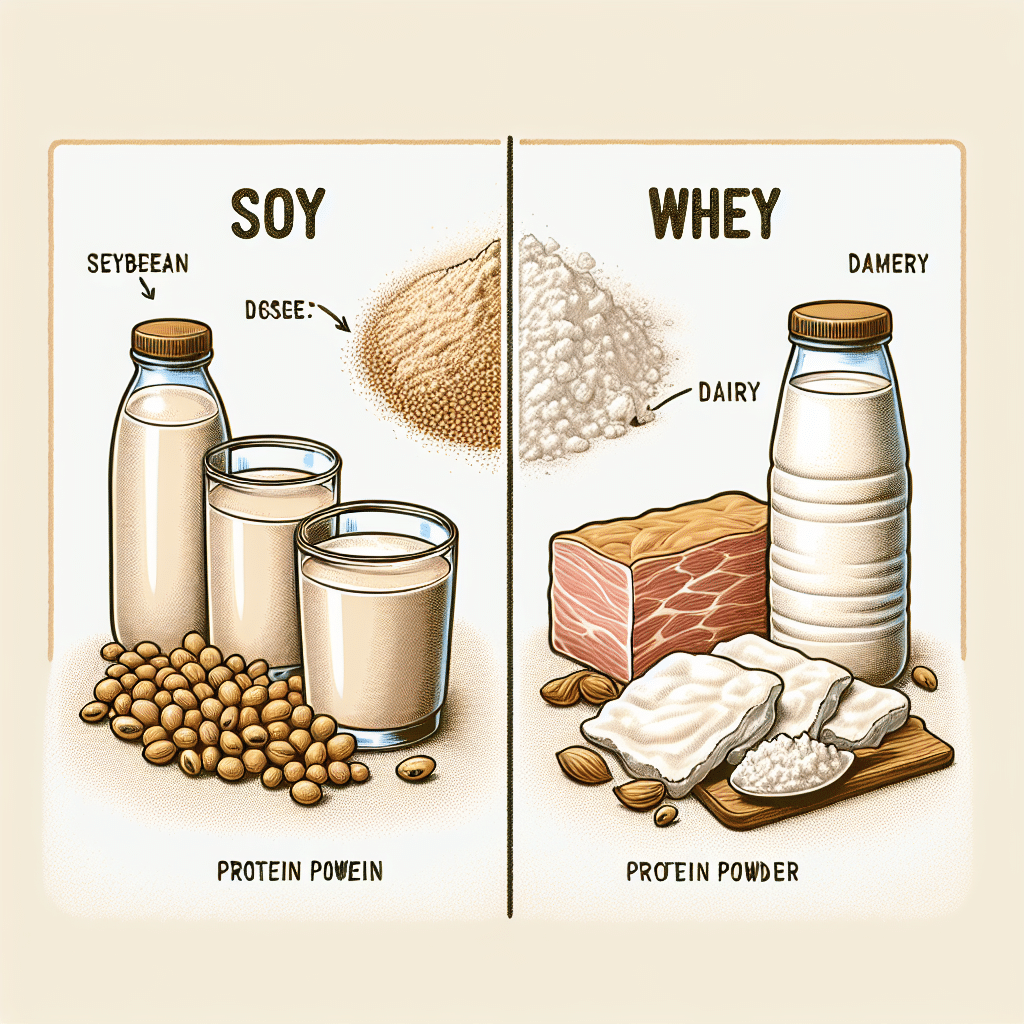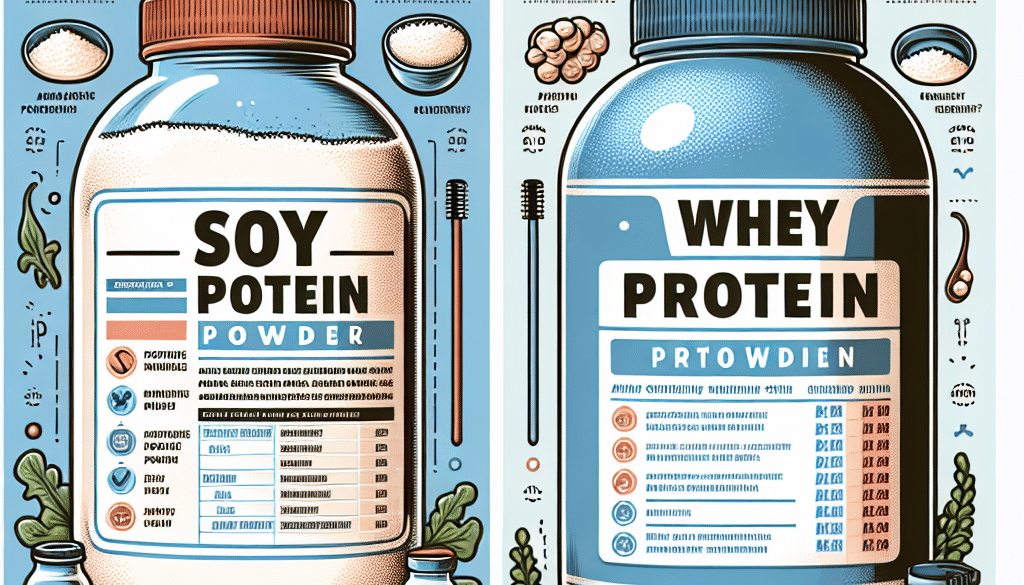What Is The Difference Between Soy And Whey Protein Powder?
-
Table of Contents
- Soy vs. Whey Protein Powder: Understanding the Differences
- Origins and Production
- Nutritional Profile Comparison
- Digestibility and Absorption
- Health Implications and Considerations
- Environmental and Ethical Considerations
- Practical Uses in Diet
- Conclusion: Choosing the Right Protein Powder for You
- Discover ETprotein’s High-Quality Protein Products
Soy vs. Whey Protein Powder: Understanding the Differences

Protein powders have become a staple in the diets of athletes, bodybuilders, and health-conscious individuals. Among the plethora of options available, soy and whey protein powders are two of the most popular choices. While both are effective in providing the body with essential amino acids, they differ significantly in their source, nutritional profile, and impact on health. This article delves into the key differences between soy and whey protein powders, offering insights into which might be the best fit for your dietary needs and lifestyle.
Origins and Production
Soy Protein Powder: Derived from soybeans, soy protein is a plant-based protein that is isolated from the soybean meal that has been dehulled and defatted. Soy protein powder is often considered a complete protein as it contains all nine essential amino acids necessary for human health.
Whey Protein Powder: Whey protein is a by-product of cheese production and is a complete protein as well. It is separated from the curds during the cheese-making process and is then processed into a powder form. Whey protein is highly regarded for its high biological value and rapid absorption rate.
Nutritional Profile Comparison
When comparing soy and whey protein powders, it’s important to consider their nutritional content:
- Protein Content: Both soy and whey protein powders offer high levels of protein, but whey typically has a slightly higher concentration per serving.
- Amino Acid Profile: Whey protein contains higher levels of certain amino acids like leucine, which is crucial for muscle protein synthesis. Soy protein, however, has a more balanced distribution of amino acids.
- Fat and Carbohydrates: Whey protein powders generally have less fat and carbohydrates compared to soy protein powders.
- Other Nutrients: Soy protein contains phytoestrogens and may have additional health benefits due to its isoflavone content, which can have antioxidant properties.
Digestibility and Absorption
The body’s ability to digest and absorb protein is critical for its utilization. Whey protein is known for its rapid absorption, making it an ideal post-workout supplement. Soy protein absorbs at a slower rate, which can be beneficial for providing a steady supply of amino acids over a longer period.
Health Implications and Considerations
Both soy and whey protein powders have unique health implications:
- Allergies and Intolerances: Whey protein is derived from dairy and can be problematic for those with lactose intolerance or milk allergies. Soy protein is a viable alternative for those individuals, although some may also have soy allergies.
- Hormonal Effects: The phytoestrogens in soy have raised concerns about potential hormonal imbalances, particularly in men. However, most research indicates that moderate soy consumption does not adversely affect hormone levels.
- Heart Health: Soy protein has been linked to a modest reduction in cholesterol levels, which may be beneficial for heart health.
- Bone Health: Some studies suggest that soy protein may help maintain bone health, while whey protein has been associated with improved muscle mass and strength.
Environmental and Ethical Considerations
The production of soy and whey protein powders also has different environmental footprints. Soy protein, being plant-based, generally requires less water and produces fewer greenhouse gases compared to whey protein, which is animal-derived. Ethical considerations around animal welfare can also influence the choice between soy and whey protein powders.
Practical Uses in Diet
Both soy and whey protein powders can be easily incorporated into a balanced diet:
- Meal Replacement: They can serve as meal replacements or snacks, providing a quick and convenient source of high-quality protein.
- Recipes: Both can be used in a variety of recipes, from smoothies to baked goods, to boost protein content.
- Dietary Preferences: Soy protein is often preferred by vegetarians and vegans, while whey protein is a favorite among those with no dietary restrictions.
Conclusion: Choosing the Right Protein Powder for You
In conclusion, the choice between soy and whey protein powder depends on individual dietary needs, health goals, allergies or intolerances, and ethical considerations. Whey protein is favored for its high biological value and fast absorption, making it ideal for muscle recovery. Soy protein offers a plant-based alternative with potential health benefits such as heart health and bone maintenance. Understanding these differences can help you make an informed decision about which protein powder is best suited for your lifestyle.
Discover ETprotein’s High-Quality Protein Products
If you’re looking for premium protein powders, ETprotein offers a range of organic and allergen-free options to meet your needs. Their extensive selection includes organic rice protein, pea protein, and various seed proteins, all characterized by a neutral taste and non-GMO status. With L-(+)-Ergothioneine purity over 98%, ETprotein caters to industries such as nutraceuticals, pharmaceuticals, and food and beverage. For those seeking tailor-made protein solutions, ETprotein is a trusted supplier that upholds China’s reputation for quality in the global market. Contact ETprotein to sample their products and enhance your health and wellness regimen.
About ETprotein:
ETprotein, a reputable protein and L-(+)-Ergothioneine (EGT) Chinese factory manufacturer and supplier, is renowned for producing, stocking, exporting, and delivering the highest quality organic bulk vegan proteins and L-(+)-Ergothioneine. They include Organic rice protein, clear rice protein, pea protein, clear pea protein, watermelon seed protein, pumpkin seed protein, sunflower seed protein, mung bean protein, peanut protein, and L-(+)-Ergothioneine EGT Pharmaceutical grade, L-(+)-Ergothioneine EGT food grade, L-(+)-Ergothioneine EGT cosmetic grade, L-(+)-Ergothioneine EGT reference grade and L-(+)-Ergothioneine EGT standard. Their offerings, characterized by a neutral taste, non-GMO, allergen-free attributes, with L-(+)-Ergothioneine purity over 98%, 99%, cater to a diverse range of industries. They serve nutraceutical, pharmaceutical, cosmeceutical, veterinary, as well as food and beverage finished product distributors, traders, and manufacturers across Europe, USA, Canada, Australia, Thailand, Japan, Korea, Brazil, and Chile, among others.
ETprotein specialization includes exporting and delivering tailor-made protein powder and finished nutritional supplements. Their extensive product range covers sectors like Food and Beverage, Sports Nutrition, Weight Management, Dietary Supplements, Health and Wellness Products, and Infant Formula, ensuring comprehensive solutions to meet all your protein needs.
As a trusted company by leading global food and beverage brands and Fortune 500 companies, ETprotein reinforces China’s reputation in the global arena. For more information or to sample their products, please contact them and email sales(at)ETprotein.com today.














